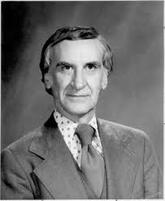 I thought I would start a series of musical memoirs, chronicling my life through music, but then politics reared its ugly head again. That has gotten me thinking about my father who was very proud to be a newspaperman. For me, this meant being gaining an incredible education in history and political science. Dad started out as a cub reporter and photographer at a newspaper in Little Falls, New York then quickly moved to Stamford, Connecticut where he worked his way up through the ranks, city editor then managing editor and finally editor-in-chief. Long before he became editor, he was a political reporter and columnist. My dad was a conservative republican, so the paper, in an effort to be fair and balanced, also had a democratic reporter and columnist. There was definitely a rivalry between these two men that I heard about daily. Dad was very good at his job and worked his way up the ladder fairly quickly. He also had some of his articles and columns picked up nationally on the AP and UPI wires. He even appeared on “Meet the Press” that was filmed in Manhattan. We weren’t sure he would survive that experience. Shy as he was, he almost passed out from the anxiety of appearing on television. Because I grew up in a household where we were surrounded by politics and current events, I was educated in a way that most of my peers were not. My parents were very social and either hosted parties or attended them often, and my brother and I usually tagged along. Most of the men at these social gatherings were lawyers, businessmen and political figures. Everyone believed that the kids should be included in the discussions, if we wanted to be. Like my dad, I was very shy, so I mostly listened, except at home. Then, I argued ferociously for what I thought was right. I rarely agreed with my dad and his cronies when it came to politics – the Viet Nam War, Civil Rights, the Women’s Movement, etc. But there was a tolerance for differing views back then, and I was encouraged to explore my own opinions and to back them up with facts. Today, a lot of my friends see the republicans as the enemy. I still see them as people who believe differently than myself. They are not evil as a group, though some of them may seem individually evil. Nor are the democrats or socialists or communists evil as a group. We are all humans, and like humans, we have our strengths and weaknesses. There is good and bad in all of us. Some of us are more ruled by emotions, some are motivated by money, and the list goes on. I’m sure my dad would not have supported Trump during the last election. Dad was an old school republican and would have been horrified by this president’s behaviors. He believed in a system of government, not in a loose cannon that does what he wants regardless of any advice from his most trusted counselors. Would he have supported this latest attack on Iran? Maybe. I’ll never know, and I wish he were here to ask. He was a brilliant man who, although I didn’t agree with his politics, was fair-minded, respectful and honest. He would have all his facts laid out for me to consider and encouraged me to do the same. It saddens me that I can’t discuss politics with friends who may have opposite views because of the emotional attachments that seem to be so pervasive. I like to know what the other side is thinking, what they believe in. I was raised to want that. When I read the news, I always try to read from more than one point of view. How can I really learn if everything is one-sided? How can we move forward, if we all have our heads in our own sand pile? We may not change each other’s minds, but we can still listen and try to understand. I think this is why we are so polarized. We’ve stopped listening and just keep feeding our anger. I’m sure that ultimately, it all comes out of fear. Unfortunately, the more we hid from diverse knowledge, the more fearful we will become. I remember a time when democrats and republicans worked together in a spirit of compromise and mutual respect. I hope it’s not too late to return to that model. Below is a eulogy written after my dad’s death by one of the many inexperienced reporters that Dad hired, having seen great potential in him as he had in so many others. I'm sorry he isn't here to talk to but I'm glad he didn't see what's become of the politics that he so loved. Editor's note: Roland Blais, who was a political reporter, columnist and eventually editor of The Advocate during the 1960s and '70s, died Nov. 11 in Troy, N.Y. Blais was managing editor in 1978 when Advocate Staff Reporter Anthony R. Dolan won a Pulitzer Prize for special local reporting. Dolan wrote the following as a eulogy for Blais. I knew Roland Blais as a friend but especially as a newspaperman, a title of which he was proud and deservedly so. Like so many others who are today at the top of their profession at the New York Times, Conde Nast Magazines and the Associated Press, I owed my own start in journalism to Roland. All of us will always be grateful for his willingness to take a risk on inexperienced writers who knew little about the newspaper business except that they wanted to be part of it and were willing to learn. And learn we did, as Roland took The Advocate from a small paper of unassuming appearance and limited influence to a modernized operation that not only had that dramatic new technology called the personal computer in its newsroom but actually ran investigative reporting articles in its news pages. As he managed The Advocate's transition, Roland built on his own experience as a reporter and editor and took the paper and its staff to new levels of achievement. Balancing the demands and needs of both the old and young -- by which I mean an 84-year-old publisher and an inexperienced staff -- Roland's tenure saw the transformation of the paper into an enterprise of credibility and impact. All of that credibility and impact would be needed as The Advocate in the mid-1970s began exposing in Stamford a classic matrix of organized crime and municipal corruption. The Advocate would uncover serious corruption in eight city departments, including a police department where a rackets commander was taking $1,800 a week from the Gambino crime family and a detective sergeant was running the largest drug ring in southern Connecticut out of police headquarters. Eventually, 15 city and state officials would resign or be fired; so too police officers, other officials and organized crime figures would be indicted and convicted. Stamford's leading political figure -- who was also state senate majority leader and talked about as the next governor -- would lose his reelection bid and a lawsuit he brought against The Advocate. At the center of all this controversy was Roland; his courage and competence were tested, and he met that challenge. Yet his influence extended well beyond helping to right wrongs in Stamford. In June of 1982 I found myself in the small personal office of Attorney General William French Smith facing a Department of Justice senior staff that had crowded into the room, among them unknown people such as Rudy Giuliani and Kenneth Starr and Theodore Olson. The attorney general asked me to tell them the story of Stamford and The Advocate and this I did, along with presenting a five-point program for a crackdown on organized crime. Out of that meeting came the anti-mob effort President Reagan announced in October 1982. In a few years, organized crime prosecutions quadrupled, and U.S. attorneys everywhere made the attack on the mob a priority. According to the head of the FBI's organized crime squads, a federal government that had been losing the struggle against the syndicates suddenly began holding its own and for the first time winning that struggle. The Los Angeles Times picked up on the role Stamford and The Advocate played and ran a story about The Advocate headlined: "Reporter's Dream Comes True." Yet it was hardly just my dream. At the time I spoke with Roland about what had come of his efforts and those of so many others. He expressed great delight. It was my privilege to visit with him and the staff in Troy and give there a brief talk on investigative reporting. I was given an engraved watch as a keepsake. I wear it proudly and often think of Roland Blais, my friend and newspaperman. So, Roland brought big change to The Advocate and his work made life better for many. Still, he was an unassuming man -- I can still see him sitting as he did in the luncheonette across from The Advocate building having the same meal he had every day. And, as I discovered when we went to New York for one awards ceremony, he was no fan of big cities. Yes, Roland Blais was Smalltown America -- and in the best sense of that term. It is traditional to write the number "30" on newspaper copy to signify the end of the story. But that can't done with Roland's story. He is remembered today as he always will be as a loving husband, father and grandfather. He will be remembered as a good friend and a newspaperman who exposed wrongdoing and stood up for the truth and helped make life safer and freer for countless numbers of people. Most of all, he will be remembered as a man of faith who followed in life the path he so firmly believed God lights for each of us to see us safely home. Today I join in your prayers of gratitude for Roland's life and in your prayers for his safe journey home and for the repose of his soul. Anthony R. Dolan was chief speechwriter at the Reagan White House for eight years and served in the President George W. Bush administration as special adviser in the offices of the secretary of state and the secretary of defense.
0 Comments
Your comment will be posted after it is approved.
Leave a Reply. |
Archives
January 2024
Categories
All
|

 RSS Feed
RSS Feed